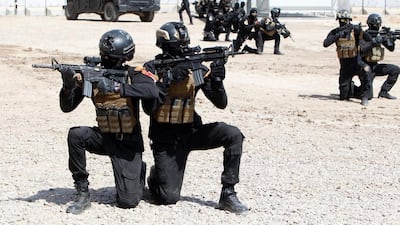Baghdad // The run-up to the battle for Mosul, the northern Iraqi city held by ISIL since June 2014, is slow but steady. Government troops are engaged in fierce battles with the militants south of the city while US engineers are busy upgrading an airbase recaptured from the extremist group last month to serve as the main military hub for the operations.
But the months leading up to the final push for Iraq’s second largest city have laid bare some of the fractures that will haunt post-ISIL Iraq. From the growing influence of the Iranian-backed Shiite militias sanctioned by the government to the simmering tensions between Baghdad and authorities in the autonomous Kurdish region.
The battle will most likely go the government’s way given how similar campaigns have ended in Anbar province. ISIL’s stunning battlefield successes in 2014 in the vast mostly Sunni region have been rolled back with the recapture of the provincial capital Ramadi and the strategic and highly symbolic city of Fallujah.
Much to their dismay, the Shiite militias were excluded from the battle for Fallujah this summer and from entering Ramadi last year.
The origins of most of the militias are rooted in the days of the US military presence in Iraq, when they fought against American troops with the support of Iran. They grew significantly stronger, better organised and armed after the nation’s most powerful Shiite cleric, Grand Ayatollah Ali Al Sistani, called for jihad against ISIL as its fighters fought their way to the edges of Baghdad in June 2014.
Tens of thousands of volunteers responded to the call, swelling the ranks of the militias and winning them a valuable religious mandate as well as the financial and material support of the Shiite-led government, which has since been paying the militiamen’s wages.
The militias proved invaluable in the weeks and months that followed the meltdown suffered by the army and security forces during the ISIL blitz in 2014 across much of western and northern Iraq, protecting the capital as well as a key shrine north of Baghdad. The militias, known as the Popular Mobilization Forces, then scored a string of key battlefield successes in the province of Diyala east of Baghdad and on the southern and south-western approaches of the capital.
The Iraqi army has meanwhile regained much of its strength and proved its worth in the battles of Anbar and in Salaheddin province, where it liberated Saddam Hussein’s hometown of Tikrit and Beiji, a city that is home to a major oil refinery. To the army, and particularly its elite counterterrorism forces, the militiamen have become an annoyance, almost a liability, on account of their widespread abuses against Sunnis, their occasional collapse of discipline and the deep involvement of advisers from Hizbollah and Iran’s Revolutionary Guard in their operations.
There is confusion about what role they will be allowed to assume in the battle for Mosul. The army wants them to focus on Shiite areas in the province of Nineveh, of which Mosul is the capital. However, militia leaders are talking about assaulting Mosul alongside government forces.
With a humanitarian emergency already emerging from the fighting south of Mosul – tens of thousands of Sunni Iraqis already had fled their homes – the presence of Shiite militiamen in the area may not be the most suitable arrangement.
The militia’s constant demands to be part of every battle against ISIL arises from their fear of marginalisation now that Mosul is the last major city in the hands of the militants. They also feel they need to be closely associated with the fight against ISIL to allow them to make maximum political gain in post-ISIL Iraq. Being seen as a major player in the liberation of Mosul could only help their quest to form the nucleus of an Iraqi force modelled on Iran’s Revolutionary Guard. Such a force would be independent from the army and police and answer only to a high religious authority – most likely Iran’s Ali Khameini rather than Iraq’s, Iranian-born Al Sistani.
Even before the battle for Mosul began, militia leaders were campaigning to replace the army as the force in charge of security in the capital after nearly 300 people were killed in a suicide bombing last month in central Baghdad. The government of prime minister Haider Al Abadi is resisting such a move.
The Kurds are another group whose desire to send their peshmerga fighters into Mosul is being vigorously resisted by the government. Baghdad fears they are unlikely to return to government control any territory they capture from ISIL or use that ground as a bargaining chip in future negotiations with authorities over a host of outstanding issues. Already, the government is gearing up for a negotiating table showdown with the Kurds over territory they seized from ISIL in northern Iraq, like some areas in Diyala and Nineveh, as well as their virtual control over Kirkuk, an oil production hub.
The government insists the peshmergas’ role in the assault on Mosul should be restricted to support outside the city, while top army commanders believe the Kurds don’t have the heavy weapons needed for an all-out assault.
The Kurds felt they were snubbed when they were not invited to a Washington meeting last month of the international, anti-ISIL coalition and, to show they were upset, stayed away from at least one high-level, planning meeting in Baghdad for the campaign to retake Mosul.
Shiite militia leaders, most of whom have little or no love for the regional Kurdish government, have made it clear that if the peshmerga is allowed to take part in the assault on Mosul, then they should be too.
foreign.desk@thenational.ae

